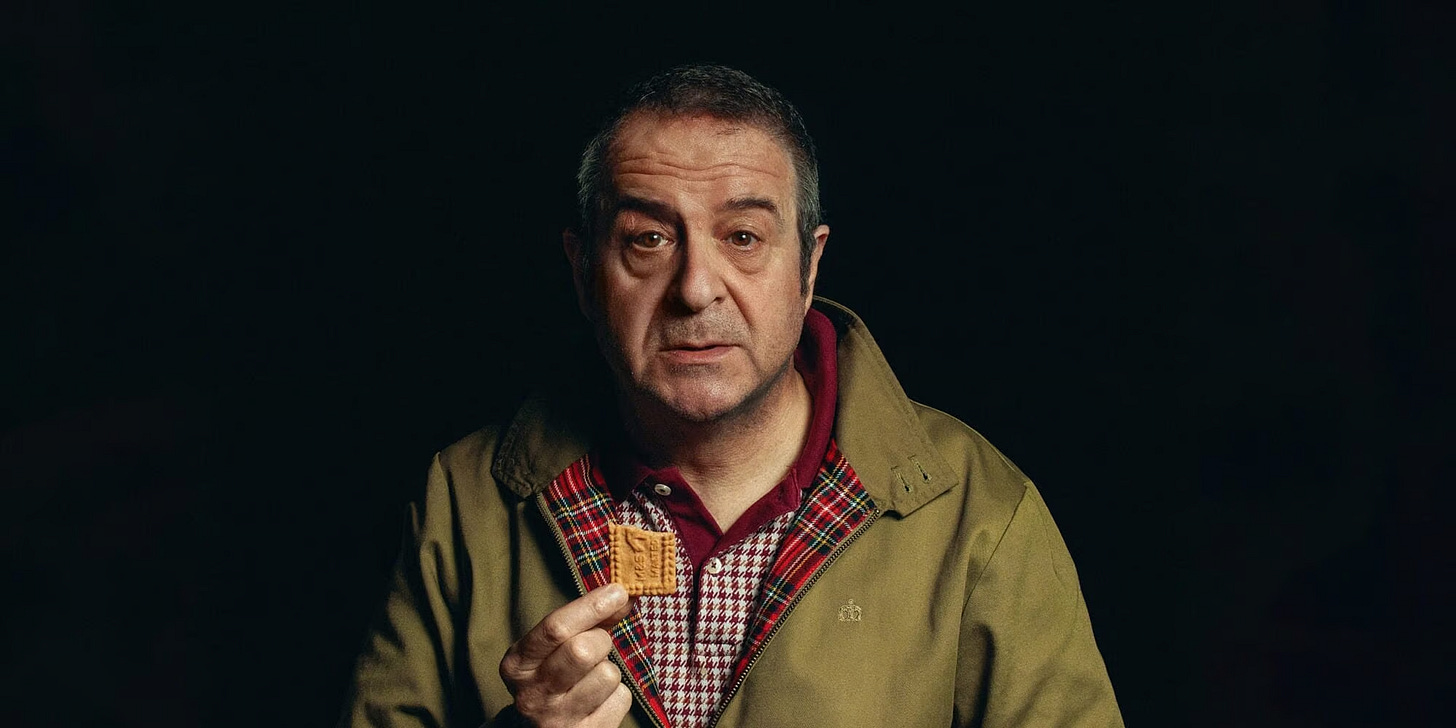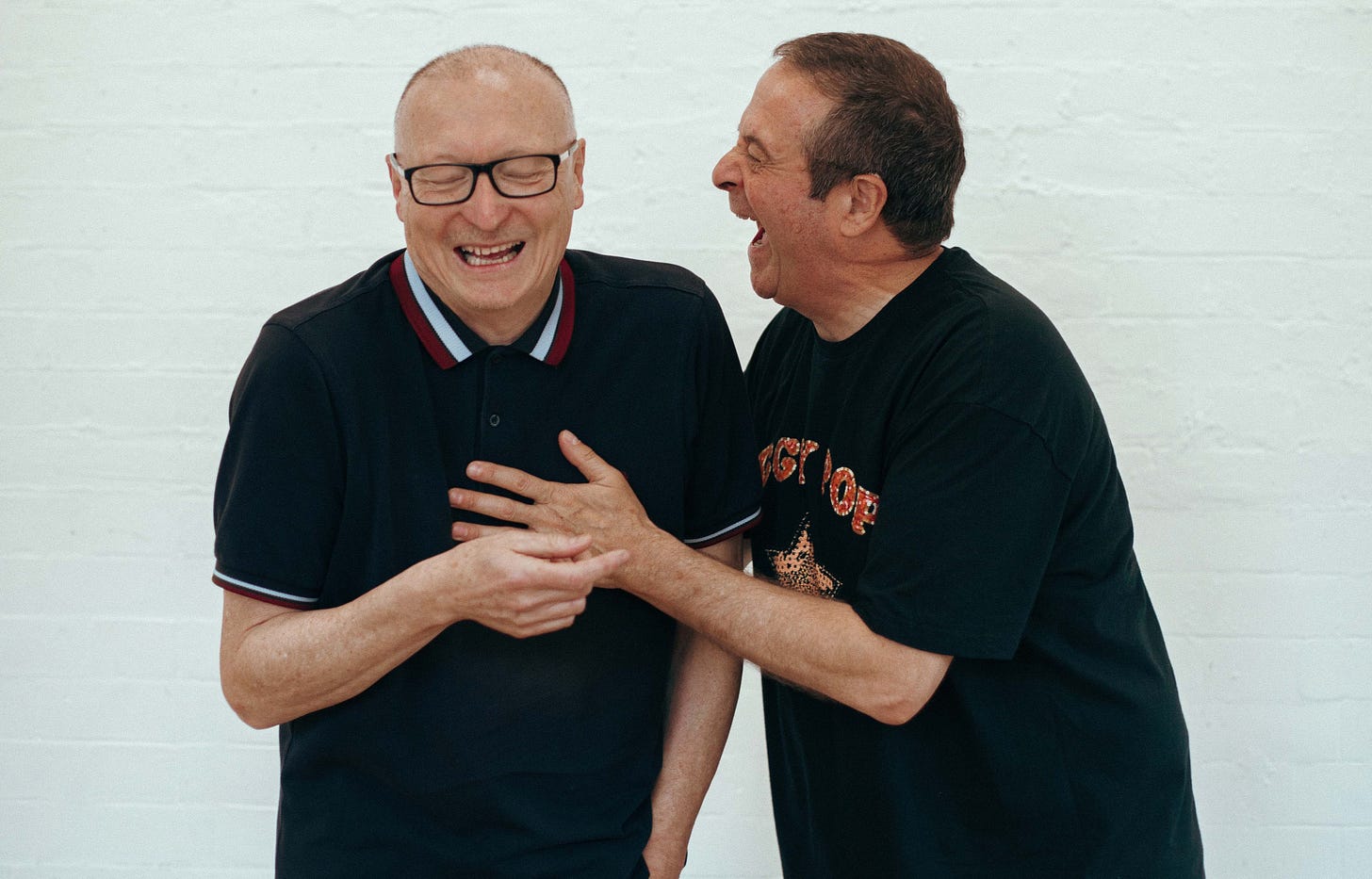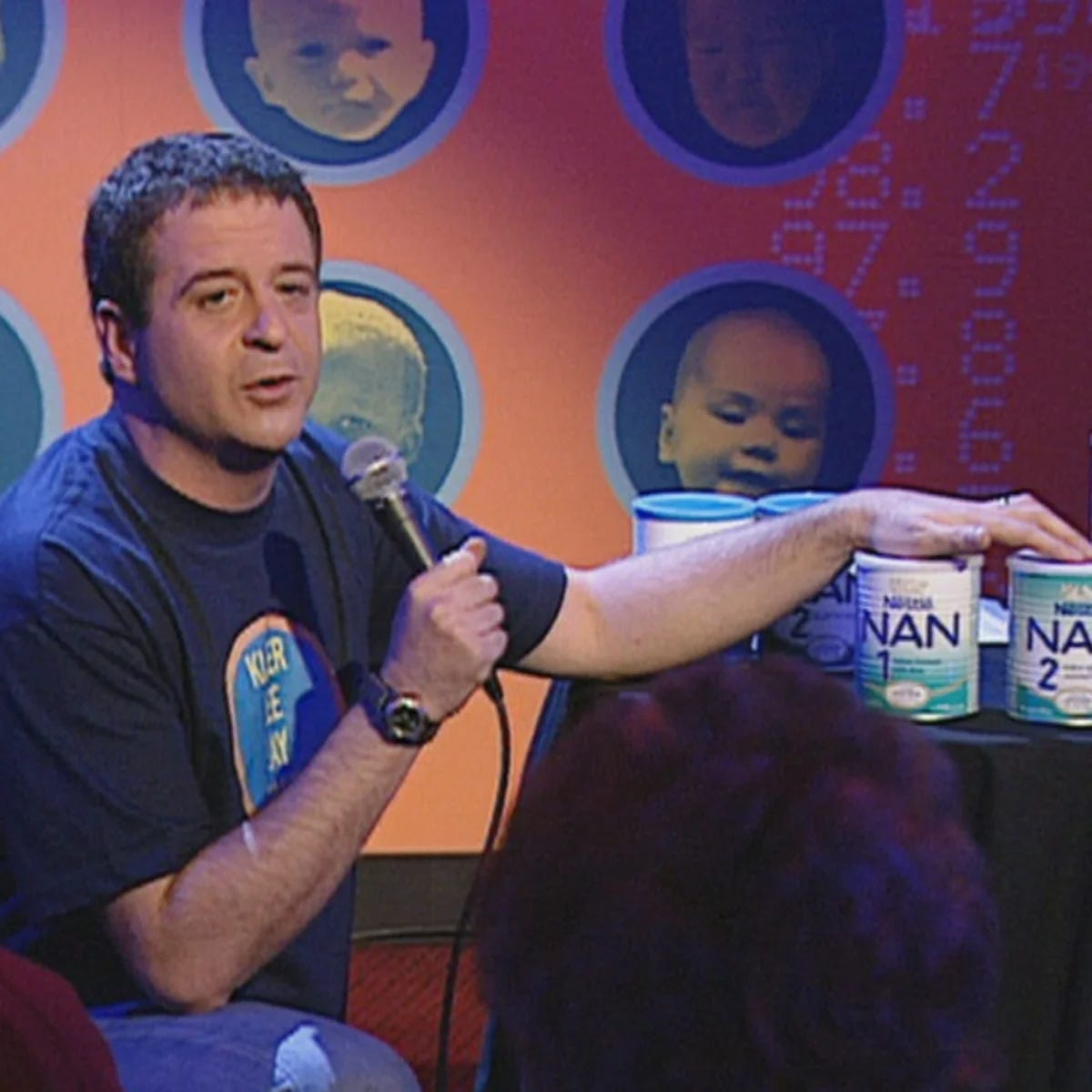Mark Thomas: "Everyone should have access to an arts education”
On the comedian and activist's 40 years behind the microphone and his recent move into acting.
I’m back in London this week, where I’ll be squeezing in several shows before Edinburgh beckons. (Just a head’s up, this newsletter is likely to become very fringe-focussed in August). While I was still in Belgrade I had the opportunity to talk to comedian Mark Thomas, someone who’s been a hero of mine for some time, about his 40-year career, his latest show, the relationship between art and protest and why we should all rename ourselves Yvette Cooper.
This is the bit when I mention that if you want to support my writing and gain access to occasional paid subscriber bonus posts, you can do so for just £5 a month or £50 a year. But this week I’m going to encourage you to donate to IMET 2000, an organisation that trains Palestinian medical personnel of which Mark Thomas is a patron. You can donate here.
Despite having 40 years of performing under his belt, the comedian, activist and theatre-maker Mark Thomas hadn’t acted in someone else’s work until last year when he starred in Ed Edwards’ England and Son, a one- man play which the playwright had written specifically for him. The experience was clearly a positive one because this year he’s teaming up with Edwards again for Ordinary Decent Criminal, which opens at this year’s Edinburgh fringe before touring the UK.
Thomas made his name on the 1980s comedy circuit and occasionally popped up on Saturday Zoo before being given his own show The Mark Thomas Comedy Product for Channel 4. Over the course of six series, Thomas become a thorn in the government’s side and that of numerous corporations. While earlier episodes mostly involved exposing MPs’ hypocrisy and finding endlessly inventive ways of making them look silly, by the later series Thomas had widened his net and was exposing Nestle’s harmful baby food marketing in Africa, campaigning against Balfour Beatty’s involvement in the Ilisu Dam and, in one particularly memorable episode, getting an Indonesian general to admit his country practised torture (while also making him look silly). Thomas made it his business to expose corruption at every level and the show became a campaigning force. (Here’s a Guardian piece looking back on the show and its impact). At some point they dropped the word ‘comedy’ from the title, which seems valid. While the show never stopped being funny, the anger radiating through the screen was often palpable.
They finished filming the show in 2002, but Thomas continued to make comedy with the same campaigning edge. While a facility with voices and skill as an orator - his father was a lay preacher, his sister is a vicar – have always been a feature in his comedy, it wasn’t until 2012 that he started to move into more explicitly theatrical terrain, writing and performing in Bravo Figaro!, a more personal show about his father’s love of opera. He followed this with Cuckooed in 2013, which told the story of how Thomas and his fellow anti arms-trade campaigners discovered that friend was being paid to spy on them by BAE Systems, Britain’s biggest arms manufacturer. His 2016 show, The Red Shed, was ostensibly about the labour club in Wakefield in which he first started performing, but it was also an exploration of the slipperiness of memory. In it, Thomas recounts a memory of schoolchildren singing in solidarity with the striking miners in 1984, an incident that shaped him and a story he has retold many times, but how true was it? He sets about trying to verify whether or not this memory is real by seeking out people who were there at the time. It was a moving and playful piece of theatre that ended up saying something quite profound about our relationship with the past.
While these three pieces, straddling the line between theatre, comedy and storytelling, were all written by Thomas, England and Son was the first time someone had written a play for him to perform. Thomas had been impressed by Edwards’ earlier play The Political History of Smack and Crack. “It was exciting and engaging in a way that I hadn't seen for ages,” he says, After the show Edwards approached him and introduced himself, and the two just clicked. “Ed and I both have certain things in common, which is obsessive behaviour and a lack of social skills, so we bonded very quickly,” says Thomas.
Later, during their time as associate artists at Live Theatre in Newcastle, they started talking about the possibility of working together. “It's an overused word, but I really mean it when I say I adore him. I think he is an amazing human being, and I love being with him, and I trust him.”
You can see the appeal of the material Edwards created for him. England and Son explores the ways in which colonial violence and generational violence are interlinked, painting a portrait of a boy who is full of passion and empathy but unable to channel those qualities in a good direction. Directed by Cressida Brown, it really tapped into Thomas’ strengths as a performer, his intensity and compassion, his whirlwind energy and stand-up’s knack for connecting with an audience. There was also, shall we say, an elasticity to his performance. “I learned most of the moments but there was a certain amount of jazz in there,” he says. However, this had its benefits. If Edwards wanted to add an extra line at the last minute, as he did on one occasion, Thomas could easily accommodate it. Similarly, a friend recalls seeing it in Edinburgh, in the intimate, in-the-round Roundabout. When a young usher accidently dropped something during a quiet moment in the play, Thomas was able to kindly reassure him that he hadn’t fucked things up without breaking the flow of the show.
Edwards is an ex-offender who wrote his first novel while awaiting trial on drugs charges, so has first- hand experience of the prison system. Ordinary Decent Criminal draws on this, however unlike your typical prison story, where someone goes inside and learns how to be a criminal, Thomas explains, here the protagonist rediscovers politics and activism on the inside. “Those are the broad brushstroke of the story, but it's also about Ireland, it's about addiction, it's about fucked up relationships, dependency, enabling and about the ability to feel genuine love.”
“The state of British prisons is fucking abysmal,” Thomas continues. “The conditions are shite. They’re over-crowded and the level of commitment to the vocation of working there is so variable it's incredible. The idea of leaving someone in the care of the prison system is absolutely horrifying.”
“There's always been a thing on the left,” he says, “which is you can judge someone by their attitude towards prison and Ireland, and this play is about both of them. It's very much about what's happening now.”
It's perhaps not a huge surprise to discover that Thomas has a drama school background. He trained at Bretton Hall in Yorkshire, where he developed a deep love of Brecht (again, not a surprise), going on a pilgrimage to Brecht’s house shortly after the fall of the Berlin wall.
He is a passionate advocate for arts education. “I think everyone should have access to an arts education,” he says. “All the people I know who went to Bretton Hall have ended up doing different and interesting things.” An arts education is valuable in multiple ways, he stresses. “Look at the amount of worth, and not just monetary value, that the arts and creative industries create compared with defence, agriculture, and fisheries.” That’s only half the story though; an arts education gives you the tools to navigate life, to think critically, to ask questions. This was true of Thomas. “It gave me a chance to investigate and inquire,” he says.
This spirit of inquiry, coupled with an instinct for mischief-making –he once devoted a year to committing 100 acts of minor dissent – has always been a feature of his work. In an effort to protest the Public Order Act which restricted demonstrations near Parliament, he set about applying for permits for multiple small, and often very silly, demonstrations, to highlight the law's impact and the burden it placed on police resources. He is understandably delighted by the fact that, following the government's plans to proscribe Palestine Action as a terrorist organisation, a new protest group was recently set up calling themselves Yvette Cooper after the minister who spearheaded the campaign against Palestine Action. “So, the barrister working for the government, had to refer to them as ‘Yvette Cooper.’ It shows the ridiculousness of criminalizing people for taking political action. We should all call ourselves Yvette Cooper.”
His actions haven’t been limited to UK government fuckery. In 2007 he made a film for Dispatches about Coca-Cola’s human rights abuses. In 2009, he set about walking the entire length of the Israeli Separation Barrier, an undertaking he detailed in his book Extreme Rambling as well as in his stage show Walking the Wall. His walk took him onto both the Israeli and Palestinian sides of the barrier and brought him to contact with locals and soldiers (he asks one bemused young IDF soldier if he has considered studying theatre).
While he was there, he visited the Freedom Theatre in the middle of the refugee camp in Jenin. Thomas was wowed by what he encountered there and how transformative and powerful art could be, even in the middle of a refugee camp. He got on like a house on fire with Juliano Mer Khamis, the theatre’s charismatic Palestinian-Israeli director, though acknowledged that the theatre occupied a complex position in the camp, and that many more conservative-minded people were against it. Mer Khamis was gunned down outside the theatre in 2011.
Later, Thomas would return to the Freedom Theatre to set up a comedy workshop with his friend Sam Beale, an experience he detailed in Showtime from the Frontline which he performed with two Palestinian comedians, Faisal Abu Alhayjaa and Alaa Shehada (who will be at the fringe this year with The Horse of Jenin). Shehada and Beale went on to set-up the Palestine Comedy Club (PalCom). “Before the latest bout of barbarity, they’d set up a network of comics both in the West Bank and on the Israeli side,” he says. There were comedians from Haifa, Hebron, Jerusalem and the Golan Heights writing material about their lives and their perceptions of each other. “When it's so hard to travel, when it's so hard to communicate, the simple act of saying to each other, this is what we see you as, and this is how we think you look like, is incredible,” he says. “To see that emerge from our little encounter in Jenin was really exciting.”
“In the middle of a refugee camp, this theatre seems to show a possible future for Palestine," Thomas wrote back in this 2011 Guardian piece about his experiences. In 2023, the Freedom Theatre was ransacked by the IDF and the theatre's artistic director and general manager were arrested. The current war in Gaza has left Thomas feeling sick and inadequate. “Gil Scott Heron was wrong. It’s being televised and we’re ignoring it.”
Thomas is clearly enjoying spreading his wings as a performer. He recently participated in The Man with the Plan, a documentary about the Beveridge Plan. “It was exciting to be in a film looking at the formation of one of the boldest government plans ever. How do you tackle the giants of inequality and squalor?” We’re speaking on the day of the release of Children's Commissioner report, which details the almost-Dickensian levels of poverty facing some children in England today. “Children are living with rats and mould. Fucking atrocious,” he says. “I fucking loathe Labour with every fibre of my heart,” he adds, in a way that makes you in no doubt he means it.
On a personal note, Thomas absolutely shaped my thoughts about theatre, about what it can do, what it should do, and I can draw a line between my earlier exposure to his comedy – I’m pretty sure one of the first comedy gigs I ever went to was one of his - and my later enthusiasm for political pot-stirrers like Oliver Frljić and Jeton Neziraj. It’s a theme we return to again and again during our conversation, the capacity of art to disrupt, to satirise, to undermine authority –Thomas tells me about the Orange Alternative, an anti-communist group in Poland during the 1980s, and how they used painted orange dwarves as a way of diffusing the climate of fear that existed at the time. It’s something I’ve witnessed first-hand in Serbia recently, and it’s this belief in art’s power, the way it can be used as a tool of resistance, that has formed the core of Thomas’ work for the last four decades.
Ordinary Decent Criminal is at Summerhall, Edinburgh, between 31 July and 24 August and touring the UK throughout the autumn. Mark Thomas: WD40 is at The Stand from 14-24 August.
This week in European theatre
A round-up of festivals, premieres and other upcoming events over the next seven days.
The Estate - Daniel Raggett’s recent production of Accidental Death of an Anarchist was one of the more subtly subversive things to hit the West End in ages. Now he directs Shaan Sahota’s debut play with a cast lead by Adeel Akhtar (one of the stars of Four Lions). It opens at the National Theatre in London on 17 July.
The Pelicot Trial - The multiple rapes of Gisèle Pelicot while drugged by her husband took place in the town of Mazan, not far from Avignon. During this year’s festival, Milo Rau presents a night of readings intended to explore the resulting historic legal case and its ramifications. Rau and Servane Dècle have collaborated with the Pelicot family’s lawyers, the court, psychological experts, legal commentators, witnesses, and feminist organisations to recount this trial which horrified the world. It takes place on 18 July.
Thanks for reading! If you have any feedback, tips, or thoughts about this newsletter, you can reach me on natasha.tripney@gmail.com







